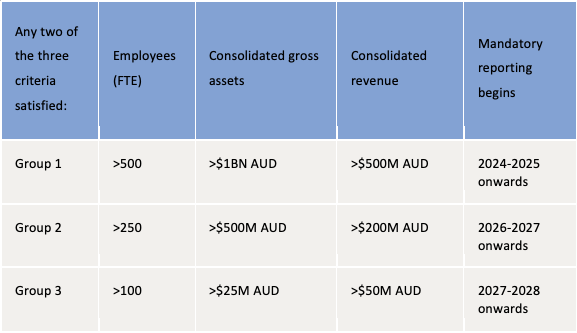Mandatory Sustainability Reporting in Australia from 1 July 2024: A Game-Changer for Environmental Responsibility
Sustainability has become an integral part of the business world, transcending its once-niche status to become a global imperative. In an effort to foster environmental responsibility and transparency, the Australian government is set to introduce mandatory sustainability reporting for corporations, starting from 1 July 2024. This momentous step represents a significant shift in corporate culture and offers a beacon of hope in the fight against climate change and the preservation of natural resources.
The Australian government has proposed a phased approach to these reporting requirements.
The Background
Sustainability reporting, often known as environmental, social, and governance (ESG) reporting, has been voluntarily adopted by many organisations over the years. It provides stakeholders, including investors, consumers, and regulatory bodies, with information on a company's sustainability performance. This information encompasses a wide array of data, from carbon emissions and waste management to diversity and inclusion efforts. These reports not only enable stakeholders to make informed decisions but also drive organisations to improve their environmental and social practices.
However, the voluntary nature of these reports has led to inconsistencies and incomplete disclosures, making it challenging for stakeholders to compare organisations effectively and measure their sustainability efforts. The introduction of mandatory sustainability reporting is set to change this by making it a legal requirement for companies in Australia.
The Key Provisions
The mandatory sustainability reporting regulations, scheduled to come into effect on 1 July 2024, will have several key provisions:
Scope of Reporting: Corporations will be required to report on a broad range of ESG factors, including environmental impacts, labor practices, human rights, and anti-corruption efforts. This comprehensive approach ensures that companies address all facets of sustainability.
Reporting Standards: The regulations will likely require companies to adhere to established reporting standards, such as the Global Reporting Initiative (GRI) and the Sustainability Accounting Standards Board (SASB). This ensures consistency in reporting across various organisations.
Materiality Assessment: Companies will need to identify and report on ESG issues that are material to their business. This assessment will help tailor reporting requirements to the specific circumstances of each organisation.
Verification: There may be provisions for external verification or assurance of the sustainability reports to enhance their credibility and reliability.
Benefits of Mandatory Sustainability Reporting
The introduction of mandatory sustainability reporting in Australia from 1 July 2024 is poised to offer several benefits:
Enhanced Transparency: It will foster transparency, allowing stakeholders to make informed decisions regarding their engagement with a company based on its sustainability practices.
Accountability: Companies will be held accountable for their environmental and social impacts, leading to more responsible business practices.
Improved Decision-Making: Investors can better assess and compare companies' sustainability efforts, promoting investments in businesses with strong ESG performance.
Encouraging Innovation: Mandatory reporting will stimulate innovation in sustainable business practices, leading to positive changes across industries.
Global Competitiveness: Australian companies will remain competitive on the global stage, where sustainability is increasingly a key element of success.
Challenges and Concerns
While the introduction of mandatory sustainability reporting is a worthy step, it is not without challenges and concerns. Some companies may face additional compliance burdens, particularly small and medium-sized enterprises (SMEs). Some small and medium enterprises that are part of a larger Australian or global group may be required to measure their carbon footprint and prepare sustainability disclosures for their parent entities if the parent entity is subject to compulsory reporting.
Many larger entities have started publicising their decarbonisation commitments such as ‘net zero by 2050’. In order to achieve their targets, they’ll be required to ensure all suppliers, customers and service providers throughout the value or supply chain have similar commitments. In August 2023, the Coles Group revealed that they intend to set sustainability targets with at least 75% of its suppliers over the next 4 years.
It will be crucial for the government to provide guidance and resources to help businesses adapt to the new requirements. Additionally, there may be concerns about the accuracy and consistency of reporting, requiring robust regulatory oversight and penalties for non-compliance.
Conclusion
Mandatory sustainability reporting in Australia, set to begin on 1 July 2024, is a pivotal moment in the country's journey toward a sustainable future. It will not only encourage responsible business practices but also empower stakeholders to make more informed choices about where they invest their time and money. As other nations are likely to follow suit, Australia's commitment to sustainability reporting serves as a beacon of hope in the global fight against climate change and environmental degradation. This move represents a significant step towards a more sustainable, responsible, and transparent business landscape in Australia and beyond.
#sustainability #carbonfootprint #transparency #climatechange #environment
For more information, please don’t hesitate to contact us via email hello@ourfootprint.com.au or call 0414 662 445.
You can also find loads of FREE information on our website Resources page at www.ourfootprint.com.au/resources


